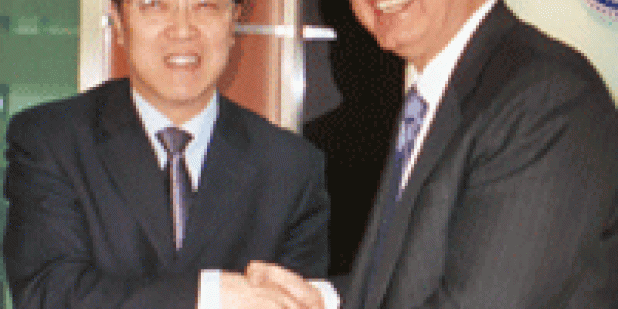Happy Lunar New Year from the USC US-China Institute!
USC Viterbi Dean Unveils China Strategy

By Bob Calverely
This article was originally published by the USC News Service on March 10, 2005. The photo shows USC Viterbi Dean C.L. Max Nikias with Tsinghua University Vice President Hu Dongcheng.
In a whirlwind trip to Beijing, C.L. Max Nikias, dean of the USC Viterbi School of Engineering, took the first steps toward implementing a strategy to increase the school’s ties with China.
On March 1 in Beijing, the dean and Dongcheng Hu, vice president of Tsinghua University and dean of the Tsinghua School of Continuing Education, signed a “Letter of Intent for Collaboration” in which the two schools agreed “to collaborate in continuing education, distance education and mutually explore areas of interest.”
“Tsinghua University is one of the most important universities in the world today and is known as the MIT of China,” said Nikias, who added that the Viterbi School receives about 110 applications per year from Tsinghua students wishing to study at USC.
“This agreement promotes USC’s internationalization strategy and builds on one of the Viterbi’s School’s great strengths, its Distance Education Network,” he said.
The Viterbi School’s Distance Education Network (DEN) offers 26 engineering master's degree programs over the Internet – more than any other engineering school – using high-speed interactive Internet technology.
DEN students take the same accredited courses from the same faculty and must pass the same exams as on-campus students.
Beijing’s Tsinghua University, founded in 1911 on the former imperial garden of the Qing Dynasty, has 13 schools and 53 departments and is focused on science and engineering.
The School of Continuing Education is a key component of Tsinghua, providing multi-level and high-quality educational programs that include professional training, distance education, international cooperative training and adult education in a variety of disciplines and fields.
The signing of the agreement followed a meeting between Nikias and Binglin Gu, president of Tsinghua, and was facilitated by a gift from Feng Deng, a Silicon Valley entrepreneur born in China who is an alumnus of both universities.
When he was a 22-year-old senior at Tsinghua in 1986, Deng read a translation of “The Fire in the Valley” about the early digital entrepreneurs and the origins of the personal computer.
“It was all about Silicon Valley, and from then on I wanted to build my own business,” he said.
Deng worked in China after graduation before coming to USC on a scholarship in 1990. He earned his MS in computer engineering in 1993 and had completed his doctoral coursework and passed the Ph.D. screening exam before he was lured away by an offer from Intel.
In 1997, aided by Silicon Valley venture capital giant Sequoia Capital, Deng and a partner, Yan Ke, founded NetScreen Technologies, a Sunnyvale, Calif., firm specializing in Internet security systems.
NetScreen has since been acquired by Juniper Networks.
“Feng Deng is a powerful role model not only for our students, but for students in China as well,” Nikias said. “He is benefiting both nations by bringing these two institutions together.”
While in China, Nikias met with Chengyu Fu, another USC Viterbi alumnus who is chairman and CEO of the China National Offshore Oil Corporation Limited, which exploits China’s offshore petroleum resources. Fu received his MS in petroleum engineering from USC in 1986.
“We discussed distance learning opportunities, specifically IT [information technology] for the oil industry,” Nikias said. “There is interest by both of us to pursue this further.”
Nikias also found time for his first visit to the Great Wall.
“It is an awe-inspiring sight and a profound reminder of China’s long and hugely important historical presence in the world. It was also very cold and a reminder of Southern California’s charms,” he said.
“We have a China strategy, one that is based on our amazing Trojan Family, which can be found all over the world.”
Featured Articles
We note the passing of many prominent individuals who played some role in U.S.-China affairs, whether in politics, economics or in helping people in one place understand the other.
Events
Ying Zhu looks at new developments for Chinese and global streaming services.
David Zweig examines China's talent recruitment efforts, particularly towards those scientists and engineers who left China for further study. U.S. universities, labs and companies have long brought in talent from China. Are such people still welcome?






